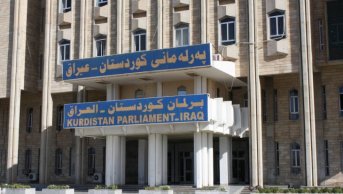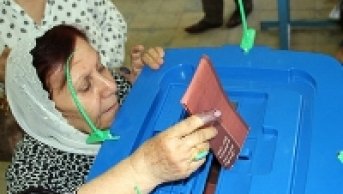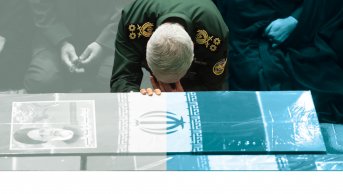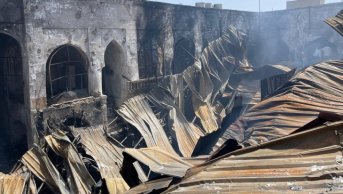A Potential Military Operation against Syria: Kosovo? Bosnia? Desert Fox?
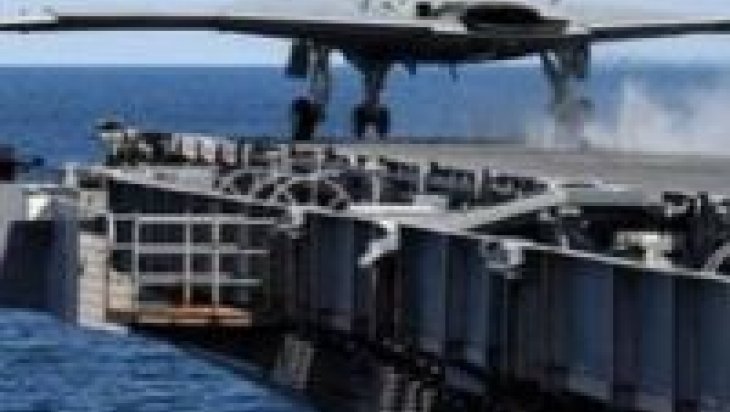
Now that the unmistakable use of chemical weapons in the ongoing civil war in Syria has been revealed, the expectation that an operation will soon be conducted against Syria has become clearer.
The statements of US Secretary of State John Kerry and Secretary of Defense Chuck Hagel, Russia's announcement that it will not fight with anyone over Syria and pages of comments in various newspapers as well as information leaked by anonymous officials all indicate that the US and its allies will carry out military strikes of limited scope and duration against Syria. Both in Turkey and across the world, there have been many assessments, opinions, and a lot of information provided regarding locations, tactics, targets and even the day of the anticipated operation. Part of the discussion also concentrates on the legitimacy of the operation. It's nothing new that the notion of targeting a leader or a regime that oppresses its people can create widely different stances and disputes on the legitimacy of taking action under international law. Yet, in each country there is a group of people and politicians that supports a strike as well as those that are against it. These disputes in the international arena over legitimacy are a part of the process in terms of soul-searching for each country. Meanwhile, well-informed news sources publish possible military targets in Syria, indicate potential locations for a strike and try to analyze the timing and how it will be carried out by examining various clues. Furthermore, some columnists have already pulled their former articles out of their archives and reminded readers of their assessments that such a strike would take place.
There have been two primary dimensions from the very beginning:
1. What is the expected outcome of the operation?
2. Will things get out of control due to developments during the operation?
What is the expected outcome of the operation?
All that is understood so far is that it has become relatively clear who will take part in the operation. Although a strong “punishment” discourse prevails in the British and French media, everyone agrees that the major actor will be the US. It is expected that other nations will provide military, logistic, diplomatic, political and economic support to the operation. That support is necessary for the tactical success of the expected kind of limited operation as well as being important in terms of its long-term outcomes. But after all, the main goal and details of the operation will be designated by the actor carrying it out and by what it hopes to accomplish in Syria. From this point of view, re-evaluating the questions above, it can be summed up as follows:
The disputes, statements, notices and leaked plans that we have seen for a week now show that the main goal of a potential military operation is not to topple the regime of Syrian President Bashar al-Assad or to affect the civil war in Syria in a way that will facilitate the victory of either one of the warring parties. The places where the Assad administration will be “punished for using chemical weapons” and therefore are likely targets have been explicitly noted. It is asserted that possible chemical weapons facilities, armories, some military facilities and government buildings will be targeted to deter Assad's administration from resorting to this option again. However, it remains to be seen whether this blatant operation will be successful in reaching the aforementioned goals. We have seen thousands of people move to other places within the country and flee to Lebanon. Clearly the people in Syria believe that a military operation could be launched soon. Thus, it wouldn't be surprising for Assad's administration to keep movable equipment, ammunition and key figures away from the target board. The following points might be concluded from the current disputes and messages:
a. The tactical or strategic goal of the US in this operation is not to remove the Assad regime. In other words, the key figures of Assad's administration can remain at ease. In a sense, it looks like a message to the Assad administration to the effect that “we will strike you for the mistake you made, but we do not aim to topple the regime. So do not resist, do not change the course of the conflict and let the operation be done.” Because, as has been clearly stated, neither the US nor other countries have reached a consensus on how a post-Assad Syria could be ruled. In addition to the absence of a clear answer to the question of what kind of a regime could be established if the current regime was removed, specialists agree that instability and even the civil war would continue, though on a different scale, even after the collapse of Assad's regime.
b. “I won't use the element of surprise, so don't you use it either.” Details such as which day the operation will be launched obviously eliminate the element of surprise. One of the most important reasons for this is that the US and its allies want to minimize the loss of civilian lives during any strike on Syrian targets. If hundreds of civilians were killed in a strike, it would not end the operation, but it might reinforce the propaganda against it. Though possible targets for the operation have been described in detail, how many people in the region will remain in their homes is unknown. More importantly, it also seems to be a message from the US to the pro-Syrian regime countries. Namely, “It will be an operation without UN authorization; its legitimacy is open to question, but you cannot stop it. Stay out of the way and do not further dramatize the situation. We do not aim to oust the regime. As a matter of fact, it will be easier to start diplomatic negotiations when things settle down. After all, the military option has already been resorted to and it didn't yield results either. So let's put diplomatic options on the table.” In other words, by not using surprise, the US is saying to Syria and its close allies, “I will not surprise you, so do not surprise me by spreading the war to other countries, increasing the violence or by damaging my ordnance. Do not push me to a harsher response.”
c. The US still has doubts on whether or not to carry out a military operation, but it has to do it for its international prestige and as a means of deterrence. In the long term, such an operation might even decrease a significant concern for the US. One of the most important issues for the US since the Syrian conflicts turned into a civil war has been the possibility that Hezbollah, al-Qaeda or other uncontrollable groups might seize Syria's weapons of mass destruction in event of a collapse of the regime. If chemical weapons facilities or armories were hit in this operation, it would be possible to at least partially avoid that threat. So a military operation also has realistic aspects beyond the expectations of the world public opinion that the Obama administration has to fulfill.
d. A message for those who support the regime. “We do not aim to overthrow the regime, but we have a problem with its leader and his practices.” It would be acceptable if Assad grew weak and the army or other organizations attempted to stage a coup during the bombing process. If the key figures of the regime were found and the effort succeeded, the regime could be dissolved without even being subjected to external intervention. Of course, it could be suggested that not only Nusayris but also other groups that want to maintain their relationship with the government consider the possible end of Assad's administration a significant threat. However, the practices of the US in the 1990s demonstrate that in a country where the opposition grows weak or is split, the US prefers the known figures from the regime or the actors with whom it can reach an agreement. If the surprise of this operation turned out to be targeting key figures, contrary to what they have said, the objective might be to create an environment for a change from inside, rather than to smooth the way for the opposition. Its likelihood is controversial, but there have been precedent attempts in other countries in the past.
With these points taken into consideration, it wouldn't be wrong to suggest that a potential operation to be carried out by the US and its allies could be like Operation Desert Fox, which took place in Iraq Dec. 16-19, 1998, in terms of the goals and possible outcomes. But what should be concluded from what has been written so far is that military power is considered “successful” as long as it serves a political strategy. However, if the US strategy on Syria is not, as stated by former US National Security Adviser Zbigniew Brzezinski, a “a secret very well kept," it seems that there is no strategy at all. Therefore, it wouldn't be possible to weigh to what extent the operation is “successful” and what purpose it served.
Will things get out of control due to developments during the operation?
The previously mentioned points are the simplified and informal version of views that is frequently discussed in the media. But although the answer to the first question posed at the outset is clearer, at least within a rough framework, the answer to the second question is more speculative by its very nature. In fact, it is quite easy to define the problem. Will the operation to be carried out by the US and its allies be a unilateral use of force? Or, will the response from the opposite party have a strategic element?
What is understood from the current picture is that it is widely believed that a potential operation will indeed be a unilateral use of force. There are four obvious reasons for this view: 1. The US and its allies have an unrivaled military and technological superiority. Syria cannot resist. 2. Syria's chief allies, Russia and China, have clearly stated that they won't respond militarily. Moreover, why would they commit to military action in Syria when they did not even attempt to do so in more critical instances related to their national interests in the past (e.g., Russia-Serbia). 3. After all, Russia will not be much harmed by the oil prices that will surely increase and would be satisfied with the guarantee that the Assad administration will remain after the operation. Therefore, there is no need for a military response. 4. The Syrian regime wouldn't want to make the situation worse just to get out of a limited strike. Therefore, Syria will put up with it. Furthermore, the allegation that it is under an “imperialist attack” could turn into an even stronger instrument of internal propaganda.
Well, isn't it likely that a short-term and limited operation that does not aim to remove Assad could get out of control and the conflict could lead to new and uncontrollable situations in the short or long term?
The key answer to this question lies behind the concept of “retaliation.” When the allied forces launch the operation, will they find a Syria and its own allies that will only defend its airspace and the targets to be attacked, or will they find a response that can change the dimensions of the war?
It is largely expected that Syria will keep to a defensive position as a response, hoping to get out of this process with a minimum of damage. Therefore, it is quite unlikely that Syria will seek to spread the war to Jordan, Turkey or Lebanon. Nevertheless, measures have been taken in those countries, just in case. What can be said at this point is that if the regime in Syria believes it could get out of the conflict with minimal harm, it will most likely not try to expand the conflict and will, instead, prioritize the survival of the regime. But a very significant detail might lead to a new unexpected situation.
Even though the accuracy of the information presented in the media is controversial, if the targets of the US correspond with or are close to the ones asserted by news agencies, then there could be a huge difference between the short-term objectives and the long term consequences of the operation. The regime, which might survive against the opposition as a result of the superiority of its military equipment and air force as well as the tight ranks of the regime, could end up with a wound that will not kill it immediately but which will not allow it to survive in the long term. The possibility that it could take months for the Syrian regime to replace significant armories, land forces and air forces with new ones if they are damaged, or not even be able to replace them at all, might cause a major threat perception in the regime (and among its allies, Iran in particular). That is to say, if the Syrian regime believes that it might lose the physical superiorities that have made it possible for the regime to carry on the war so far, it might cause the conflict to turn in a direction that will change its nature. That could be a surprise for everyone. On the third day of the operation, the demoralized Assad administration with damaged air forces and major physical damage would not be able to spread the conflict abroad. Thus, if the Syrian regime sees its only way out as using surprise and expanding the conflict, the Syrian response could turn the plans for an operation of limited scope and duration in unexpected ways. Much speculation could be made regarding where, when and how such a response could take place and with the support of which state or non-state actors. But if the regime believes that it would survive after a harsh but short-term storm, then it might take a strategic stand to secure that survival.

